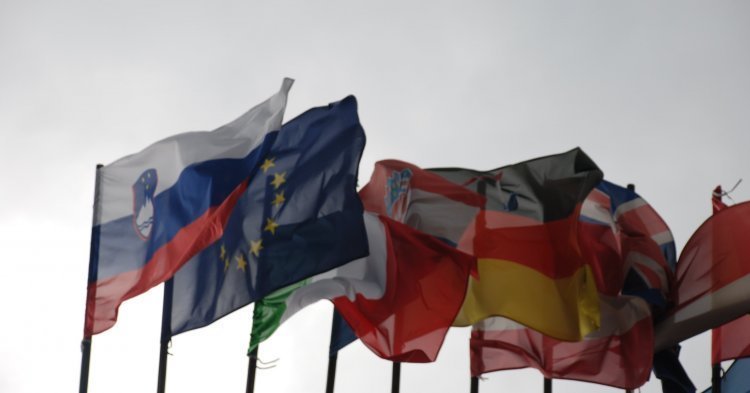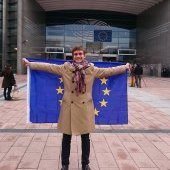A viscerally European destiny
Slovenia has everything that it takes to be a model member of the European Union: having gained its independence from Yugoslavia in 1991 at the end of a near-victimless blitzkrieg, the country immediately and loudly proclaimed its wish to join the European family. Despite some delays in the negotiations, it joined the club in 2004 at the same time as seven other Central European and Baltic countries, and Malta and Cyprus.
The next six years or so marked a success story for the “Switzerland of the Balkans” – its development soared, the economic growth rate reached 6.9% in 2007, and numerous foreign enterprises relocated themselves into Slovenian territory, which confirms the success of the export-oriented economic model. The nickname of “tiger of Central Europe” often appeared in public discussion.
Despite some concerns on a number of questions related to the treatment of minorities – Roma and people from other Yugoslav republics – the country stands out as a model of democratic development. A healthy alternation between the right and the left allows for regular renewal of ideas in the almost completely pro-European political class committed to an ever closer Union.
Out of breath
The momentum following the integration of Slovenia into the European project, however, came to a halt. The economic and financial crisis hit the country with full force, along with a growing contempt of political elites. The climate of governmental instability, permanent since 2010, has concentrated the energies of the country on its internal problems and on recovery. Structural reforms in public services such as health care, universities and the judiciary, the country’s infrastructure and questions of immigration are in the spotlight, at the expense of deep reflection on the country’s place in Europe.
And for good reason: after the successful EU Council presidency in 2008, Slovenia progressively lost the expertise that it had acquired concerning the functioning of institutions, mastery of the policy dossiers, and its new networks. The administration has also interrupted its cooperation with a number of professionals who continued their careers in the private sector or abroad. [1]
When it comes to the European ambitions of Slovenia, since 2008 they have very often been limited to the resolution of bilateral disputes with its neighbours and the adoption of rules made in Brussels. This lack of strategic reflection comes with a cost: a recent study by the European Council on Foreign Relations gave Slovenia the unenviable title of the “least influential country in the EU”, alongside Croatia, Malta and Latvia.
A new period of Euroscepticism
What about the Slovenians’ mindset? Many see Ljubljana as a “good student in class”, Europhile, rarely opposed to reforms recommended by Brussels and willing to be part of the “hard core” of European integration. The President, social democrat Borut Pahor, doesn’t hide his intention to get closer to Paris and Berlin – he is the only head of state currently in power inside the EU to explicitly call for a “United States of Europe”.
However, the reality is more complicated. According to a recent Eurobarometer survey, Slovenia is among the most Eurosceptic countries: only 44% of Slovenes tend to trust the European Union, against 50% who tend to mistrust it. This is a figure similar to that of the Eastern neighbour, Hungary, better than France and Italy, but worse than Germany, Romania or Bulgaria. Federalism gathers even smaller crowds than elsewhere, and sometimes reminds people of socialist Yugoslavia.
The reputation of the EU has been tarnished by economic, banking, budgetary and political crises that have shaken the country. The public opinion and the political class are sometimes fired up by recent affairs where Ljubljana hasn’t succeeded at winning in the Brussels game: disputes on the maritime border, conflict with Croatia on the name of a national varietal wine, or the privatisation of the country’s largest bank.
An emerging pro-European civil society?
With a little exaggeration, Europe might, however, need a country like Slovenia: a terrain of exchange and tolerance that has preserved its identity despite Venetian, Habsburg and Yugoslav rule. Slovenia, conscious of its limited size and capacities, has no other choice for its survival than cooperation, and could never indulge in the luxury of “glorious isolation”.
Moreover, the country isn’t lacking expertise: many are the policy areas – environment, circular economy, management of the external borders of the Schengen Area, enlargement – where Ljubljana could, if not take leadership, at least have a respected voice. This possible role of “thematic leader” of course depends on the human, financial and strategic resources that are mobilised by the new centre-left government that entered in office last September.
Europe is also made by civil society and by young people: after several years of silence, in 2017 the Young Europeans (JEF) was reborn from the ashes in Slovenia, moved by the desire to bring Europe, federalism and European values to the forefront of the public debate from which they have been all too absent in the past five years. JEF Slovenia is a movement inspired by other initiatives in existence, and one that can show itself as an example to others.
The Slovenian case demonstrates the key role that small member states can play when it’s time to shape the Europe of tomorrow. Two questions arise: how can the European project continue to benefit them? And how can these countries put their potential at the service of the European project?


Follow the comments: |
|
